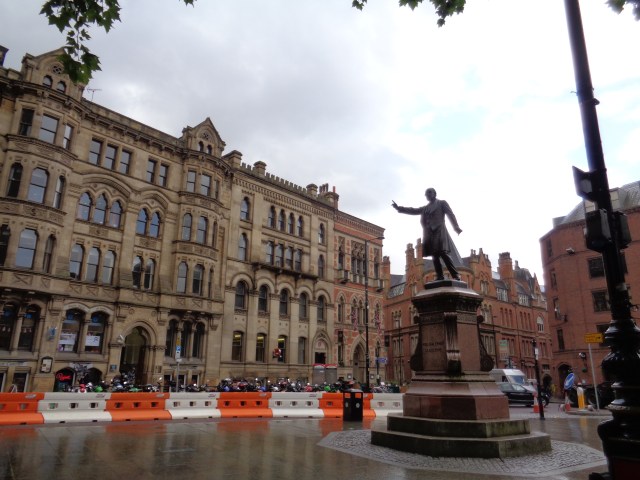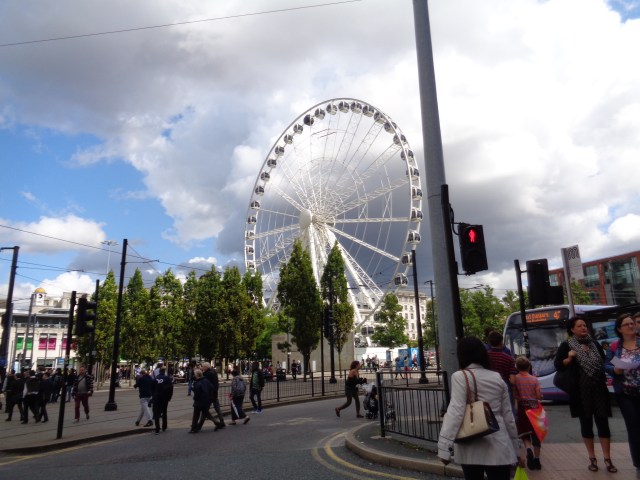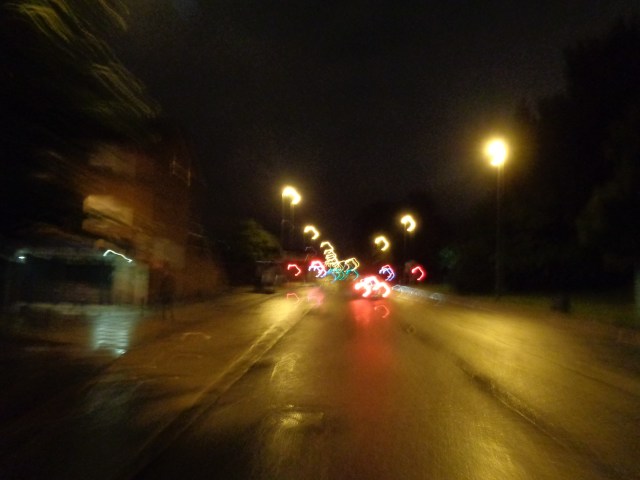Dawn, Albert Square
Golden light streaks down Mount Street, casting shadows over William Gladstone, cast in metal and stone. Pigeons are stirring, the occasional swooshing of a passing taxi’s interrupted by the gentle swishing of a sweeper-truck. I’ve landed here without a ticket or an alibi, into a city with no clear exit or entry. Cottoned in thick rings of terraced suburbia, brown brick and cramped, remnants of the dwellings where the working class built this city, roads snake in and out to a centre with no obvious centre. Lost, it might be 6am. Pause here.
There’s no statues to the textile workers, the dockers, the railway workers, the blood of this city. Who made this place might be a frustrating question to ask. Look up at the buildings. Money did, free trade, each shrieks. The Town Hall in its neo-gothic splendour, statuettes of knights and kings and queens. The extension next, Art Deco in style, a second wave, you felt sure of yourself. The Central Library with its classic pretensions, your belief that you had citizens, not subjects, that the working class would thrive through access to learning and culture, and your strange paternalistic assumptions about what that might mean. No pubs, regulated football. Then the Midland Hotel, red-brick and self-important, next to Bridgwater Hall, brassy glass façade of the modern age. I peer around each corner at these weird interruptions, the expressions of money filtered through different cultural presumptions: civic pride, crafts, a return to classic values, the adoration of property and free markets, each side by side. Was it always about the flow of money?
The bodies and stories must be hidden somewhere. You’ve knocked down the chimneys and rebuilt your city centre in the colours and forms of the future according to Corbusier, Richard Seifert and Tony Blair. Perhaps I’m looking in the wrong places. I might be better off heading out south to Moss Side and Hulme, where you once ghettoised your workers, or west to Salford, or out north to Cheetham, and north-east to Harpurhey. Friedrich Engels says you were made this way.
‘The town itself is peculiarly built, so that a person may live in it for years, and go in and out daily without coming into contact with a working-people’s quarter or even with workers, that is, so long as he confides himself to his business or to pleasure walks. This arises chiefly from the fact, that by unconscious tacit agreement, as well as with out-spoken conscious determination, the working-people’s quarters are sharply separated from the sections of the city reserved for the middle-class; or, if this does not succeed, they are concealed with the cloak of charity.’
Neat trick. But no matter how well you bred your children, the south-east clings onto its cultural hegemony. Anything with an accent is deemed to display its inferior class. It still plays out today, when prime ministers, business figures and journalists share the same school tie. Mothers on the back-to-back terraces with a little money on the side sending their sons and daughters for elocution lessons. ‘The working class did not rise like the sun at an appointed time. It was present at its own making’, that was E. P Thompson, writing about Halifax but writing about you too, about Peterloo, nearby. The bosses and merchants of the Free Trade Hall and Town Corporation didn’t want their workers thinking or discussing. Trade Unions began in Glasgow and they began in you, among workers in skilled trades like textiles, dreaming up something so scandalous as the right to vote. Labour, co-operatives, a working class that knew its own name, that had read Thomas Paine, William Morris, Keir Hardie and Karl Marx.
‘Down with class rule.
Down with the rule of brute force!
Down with war!
Up with the peaceful rule of the people!’
The rule of the ‘people’? That was Keir Hardie, 1914, making an appeal to the working class, and to you, on the eve of a coordinated European slaughter of the revolting industrial working class. But you had a people, you had a working class. They built this city, but you won’t let the people here remember it. A rough-sleeper shuffles through this square I’m in, the first person I’ve seen, face pale like a ghoul, eyes sleepless, city hobgoblins. Send him to a foodbank, he has no money for the gas to warm the food. It’s his own fault, attitudes to welfare hardening. God damn this in between moment in political history, in the age between the working class and the dead exhausted class. Late, skint, indebted, depressed. Anger brewing but frustrated, lashing out against nearby objects. Conversations in the night, falling out with your lover. Disappearing again, back in mental and spatial time-zones, thoughts of the past, thoughts of memories, a paralysing melancholia gripping the dreamers of revolution.
Your museum pays lip-service to their struggles. Class codes have been scrambled. Property speculators, credit cards, the still continuing divide and rule of race played out through the cipher of religion, Islam, Judaism. Education lifts you out of one class and puts you in no class. Skint, indebted, angry. Post your anger on a blog, on a placard, slap bang into the data stream that reaches oblivion a nano-second later.
‘The working class has been shafted, so what the fuck are you sneering at?’ MES, your son, his fifth pint in the Forresters, or the Woodthorpe, or wherever’s open in Prestwich, making no sense these days. Morrissey’s in America attempting to be relevant. Where’s your voice?
Now the textiles that you have made unmade you, an empire in decline. The soot and the fogs. Hard livers with hard livers. City hobgoblins, spectres, a ghost in my house til the slum-clearers pulled it down and sent us to Hulme Crescents, cities in the sky. Dreams of a socialist future that were pulled down and replaced with low-rise, low-intellect, low vision architecture. We’re in between again. A pigeon sits on the head of Gladstone and opens its bowels. Who is Gladstone, who is anyone. Morning’s further along, and people are rushing to work. Headphones in, checking their emails, their smart attire collides against my shoulders, their fragrances collide against the odours acquired through travel, through sleeping in a tent underneath electricity pylons across England and Scotland, and long unfamiliarity with a washing machine. Do they see what you saw, do they think what you thought? We’re in between moments, in between times.
Afternoon, Piccadilly Gardens
Football, kick a ball, score a goal. ‘This is what we live for’, a cheery son of yours tells me. We’re watching the milling crowds shopping with their eyes for some pleasant distraction. A new jacket, booze, chocolate, little treats, toys for adults who no longer look or live like adults. City or United pal?
I wish I knew. I’m been waiting for a guide to come and take me by the hand. If only these sensations would make me feel the pleasures of a normal man. University students from China and west Africa, learning here, finding knowledge here. I’m hungry, so I head into one of ten trillion local supermarkets that have erupted all over this land like Japanese knotweed. The supermarket veg is better travelled than most of your sons and daughters will ever be. Everywhere sells the same things. Under the pavements, the beach, said your children, now parents, out in Paris, out conspiring in squats and social movements forty years back. North and south becoming indistinguishable. Knock down your Albert Square, knock down your back-to-backs, and welcome into a dream age of cultural indiscernibility. A Ballard land of shopping malls where nothing matters.
‘All my people are lonely. Crowds are the most lonely thing of all. Everyone is a stranger to everyone else.’ Lowry’s wandering round here, cane in hand, trilby hat, feeling awkward amongst these crowds but compelled to record them. He’s sketching with a pencil on the back of That private misery that was once your average white male early Modernist’s, over-stimulated, under-socialised, now stretched out to these young folk here, headphones in ears, debts up to their eyeballs, political change beyond the horizon.
‘I was sorry for them, and at the same time realising that there was really no need to be sorry for them because they were quite in a world of their own’. Lowry’s cripples are today’s cripples, in a world of our own, adjusting the music and the scene, retreating into reproducible images of what are presented as our desires. Desire’s become a lack, dream’s become a need.
‘We like prosperity filtered through car and appliance sales. We like roads that lead past airports, we like airfreight offices and rent-a-van forecourts, we like impulse-buy holidays to anywhere that takes our fancy. We’re the citizens of the shopping mall and the marina, the Internet and cable TV. We like it here, and we’re in no hurry for you to join us.”
That’s J.G. Ballard, driving through you in his mind from distant Shepperton. Your semi-detacheds and your malls could be in Staines or Twickenham, or Ickenham or Ipswich, or Preston or Prestwich, anywhere at all. Sending up these dreams that were not dreamt, desires that were not desired. Your sons and daughters hurrying hither and thither, late again. When do we turn actions into dreams, dramatise ideas into change, I ask to an empty crowd. Your suburbs are being regenerated, scrubbed clean, but there’s no hiding the grit and grime that is people’s lives. These malls, these glassy shite office blocks. They’re not enough, and I think you know it too.
Night, Salford
What lives beyond after a life well lived is spent? There is a light that never goes out, but drifting out by Salford Quays, one could be forgiven for thinking anything existed here before 2003. They’ll sweep you away too if you lose these dreams of civic pride, of the people that built you and made you. There’s these quays that mean nothing, avenues all lines with trees that lead to a half-full office block. No soul stalks here except the passing office worker, a tough day today.
‘I think that every man that is to live under a government ought first by his own consent, to put himself under that government.’ That’s Thomas Rainsborough talking, addressing a large crowd of curious passers-by who are today flicking through Sky Plus, searching fruitlessly for some lost pleasure which won’t be found here, like trying to find a pearl in the sand. The decisions are made elsewhere, delegate and demarcate, lost in the post. Perhaps it’s too much struggle striving. I’m passing here just watching the lights flicker through the glass, wondering how dates these Norman Rogers’ dreams will look in thirty years time, and what will replace them. I see cleaners hovering between the windows.
‘They are ghostly figures … They are symbols of my mood, they are myself.’ I can’t help quoting Lowry, because sometimes only voices of the past make sense, like a parent, or singer, or the sound of the wind, the air that was elsewhere ten seconds ago, or the light of the stars, barely filtered through your ever thick clouds, transmissions from millions of light years. Escape’s always been on the tip of the tongue, ‘they keep calling me’, those dead souls stalking Ian Curtis, escapism into drugs, or travel, or dreams of revenge, the north will rise again. But it will turn out wrong. Perhaps it need not. The neoliberals put the torch to the docks, as they’ll put the torch to your civic pride, unless you stop them. Stop looking to London with fingers covering your eyes! Manchester, so much to answer for. But they will, because struggles are widening, fissures are deepening. There’s only so much money to be made, land to be speculated, energies to be burnt. You’re asleep, but you haven’t had a dream in a long time. The luck you’ve had could turn a good town bad.
Still, something’s unanswered. I’ve felt it in the conversations here, in the moods here, the disputes here. There’s promise without need for excessive pride. I’m lost again somewhere by MediaCity, lost as I started the day by Albert Square. Nothing points left or right, only up and down. Look up to the secret splendours of these buildings, to the joys and dreams in the minds of the people I’ve spoken to, it’s there. Let me finish with Lowry, talking about somewhere else, but let’s attribute it to Manchester, this proud city’s cocky enough to pull it off.
‘The battle of life is there. And fate. And the inevitability of it all. And the purpose.’
Written as writer in residence for Manchester Left Writers.



Leave a reply to johnledger Cancel reply